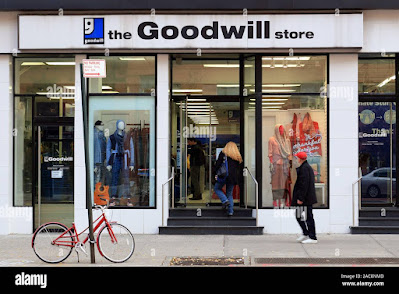You might ask what the economy has to do with preparedness and survival, but the two are inextricably intertwined. When the economy is healthy, families have the cash to prepare for the unanticipated. They are able to buy generators, medical supplies, to take classes, and experiment enough to know whether they should raise Coturnix quail or make cheese at home. In a bad economy, there is no money to invest in firearms lessons or much else. People also may not invest in as much house or as much land as they need for the future.
In the past thirty years or so I have used a rather non-scientific way of gauging how I think the economy is doing. However, it seems to actually be an effective one. When the economy is good, families who are doing well regularly donate to second hand shops like Goodwill. In a good economy the goods can be surprising. One might find sterling silver, ten karat gold items, coins, rare books, satsuma vases, Wedgwood, cast iron cookware, camp ware and sterling flatware. Sometimes, surprising and valuable collectibles make their way through Goodwill. In a good economy, families donate new unopened bedding and comforters just because they have rethought the color scheme. I bought a number of quality new sleeping bags at Goodwill a few years ago, donated by a sporting goods shop. Of course, the same is true of clothing and shoes. New quality clothing and shoes are donated often in a strong economy. When the economy begins to slip, families continue to donate, but less often. The prices in Goodwill remain about the same. When the economy is bad or is in trouble, this is reflected rather accurately in donations to Goodwill. Many families stop donating at all. When they do, they donate used sneakers, and some items that probably should be thrown away. Goodwill notices that their dumpster is filling up more readily than it had been because the goods being donated aren't of the quality they were. This also triggers some rises in price. Right now, for example, Goodwill is charging more for used clothing, shoes, puzzles, games housewares, DVDs etc. than they ever have. When I am in town, I look at one of three Goodwill and a couple of independent thrift shops and the trends are the same. Just now, people aren't donating as much, and prices are higher than normal. I find that I can go through them all, and buy nothing, when in the past I found plenty of things that were useful to us.
Craigslist is also a great economic indicator. Since I live in the country, I watch three small cities in my state, and the trends are also the same. A few years ago, the free items on Craigslist were amazing. There were free RVs in reasonably good condition. There were canoes, fishing rods, construction supplies including unused bags of concrete, landscape rock, new bricks, cinderblock, boats, new house shutters, exterior doors, and fairly new furniture all available for someone to call about and pick up. Presently, this has changed. You might find used moving boxes, magazines, a couch and chairs that require recovering and have been in the alley for a couple of days. Trends now are for many things free on craigslist that someone just may not yet have the courage to throw away. Other sections on craigslist have become much more expensive. Cars for example, used to be $800-$1500, and one could occasionally find something quite nice for $3500. The car ads are now quite rare, and the prices range from 25K-35K. One used to be able to buy a refrigerator or stove on craigslist when someone was redecorating their kitchen color scheme. There has been quite an increase in the cost of used appliances, in part because there has been a significant jump in the price of the new ones also.
Garage sales and free sales work similarly. In good economic times, when people move, they often place very low prices on household goods as they are confident that they can recoup these similar items where they are going in pretty short order. Lately this is not happening, People have been selling items for near the new price, and trying to take more of their goods with them, as they are not at all confident that they can afford these items again when they get where they are going.
I think it is a fair assessment that as the economy is squeezed in the US, that families do not part with goods as readily. This means that when others seek to find items that could well be purchased with light wear, they find this more difficult. This makes it harder for young families to establish themselves, harder for young people to move out, and it makes it harder to prepare in advance for emergencies or for tough times.
My non-scientific way of assessing the economy says that we are in genuine trouble economically as a nation just now. Preparedness is therefore more necessary than it ever has been.


